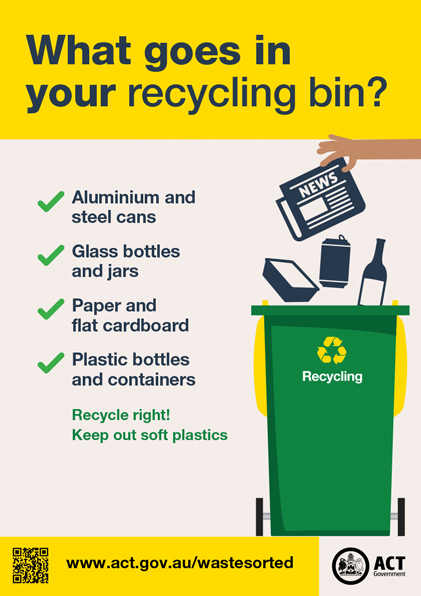Recycling is simple when you know how
Recycle these in your recycling bin:
✔️ aluminium and steel cans
✔️ glass bottles and jars
✔️ paper and flat cardboard
✔️ plastic bottles and containers
The items in your recycling bin are sorted by material type, baled and transported for recycling into new products.
Help to recycle right! Remember:
- no soft plastics
- items must be empty
- lids off
- keep out items smaller than a credit card.
Excess household recycling can be dropped off for FREE at a Recycling Drop Off Centre.
Drop off other items
Some things don’t belong in household bins. Batteries, televisions, computers and hazardous waste, clothing in good condition, bulky items all have other places to go.
Soft or ‘scrunchable’ plastics cannot go in your recycling bin but can be put in the landfill bin.
The REDcycle soft plastics collection program has ceased.
Not sure if an item is recyclable? Search the Recyclopaedia, your A - Z guide to waste sorted.
Find out where to drop off recycling and waste in the ACT.
Frequently asked questions
Anything small is unable to be sorted at the Materials Recovery Facility as it falls through gaps in the recycling machinery and can contaminate our recyclables and glass sand. This means items smaller than a credit card are simply too small to be sorted and separated effectively.
Please remove lids and place anything smaller than a credit card into your landfill bin.
Steel can lids can be left attached to the can to be recycled and some lids that are larger than a credit card can be captured by the magnets such as larger steel lids from jars and Milo tin lids.
Keeping recyclables clean is important to ensuring they can be processed effectively and are able to be sold as a high quality product, ready to be reprocessed. We need people to wipe, scrape or rinse out food and drink before placing containers in the recycling bin.
If you’re keen to rinse, adding the empty containers to your daily dish washing pile, means they can be cleaned without using any extra water.
The sorting process at the Materials Recovery Facility means that staff are unable to open bags or boxes for safety reasons and so bagged or boxed material gets removed from the conveyor belt. Keeping items loose ensures they can be sorted by material type.
Put clean cardboard into your recycling bin but make sure it is empty and flat. Flat cardboard maximises the available space in bins and collection vehicles and helps to ensure cardboard is not contaminated with other materials such as polystyrene.
Paper and cardboard also need to be larger than a credit card to be captured by machinery at the Materials Recovery Facility. This means we cannot accept shredded paper.
Shredded paper is great in home compost, worm farms, as bedding in chicken coops or for small pets. If you have shredded paper, why not let your local community groups know, as there are often people happy to take it off your hands.
No. A Plastics Identification Code (a triangle with a number inside) may be stamped on a product to indicate what type of plastic the product is made from. This code does not signify that something is recyclable. Not every plastic item with a plastics identification triangle symbol is sorted at the ACT Materials Recovery Facility. Only packaging and containers with the symbols 1, 2, 3 and 5 are accepted in the recycling bin. Our factsheet provides more information about the Plastics Identification Codes.
Some materials are currently recycled back to what they started as, such as plastic bottles and paper products – closing the loop of the product’s life cycle.
Others are transformed into completely new products such as furniture, car bumpers and shelving.
Some materials, such as steel and aluminium cans, have no limit to the number of times they can be recycled back into new products.

